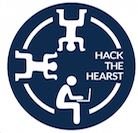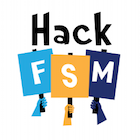Past Work - Digital Humanities at Berkeley, January 2014 - April 2016
In July 2014, UC Berkeley was awarded a four-year grant from the Andrew W. Mellon Foundation. With the goal of “Capacity Building and Integration”, a new partnership between Research IT and the Dean of Arts and Humanities set out to better support existing projects and foster new digital humanities research and pedagogy. As hire #3 of this budding program, my role evolved to meet the program’s various needs in communications, community outreach, training, curriculum development, and course support.
What is/are the digital humanities?
The digital humanities encompass disciplines such as history, literature, new media, Near Eastern studies, music, art history, art practice, and more. Researchers use a variety of tools and techniques, such as natural language processing, geospatial analysis, network analysis, data visualization, and 3D modeling.
Blogging
The DH at Berkeley blog featured interviews and guest posts by students, professors, and staff members from around campus. During my time as editor and main contributor, the blog explored questions such as: How does DH research facilitate new opportunities for collaboration? What new research questions and concerns do these technologies raise? How do humanities scholars approach training and joining a community of practice?
- DH Fellow Eduardo Escobar on Analyzing Social Networks and Semantic Networks in Assyriology
- Project Sustainability in DH: Collaboration and Community
- The Cost of Customization: Building, Maintaining, and Sustaining DH Projects
- Python in Service of the Beautiful and Weird: Kyle Booten Teaches “Poetry and Technology: A Digital Verse Lab”
- Prof. Lisa Trever and DH Interns Apply 3D Modeling and Photogrammetry to Art History
- Prof. David Bamman to Offer Interdisciplinary Critical Data Science Course Spring 2016
Resource Guides
DH at Berkeley resource guides are aimed at humanities researchers who are exploring new tools, seeking training, and looking for potential collaborators. The guides below have been selected for their relevance to non-campus readers:
- Data Prep and Cleaning
- Writing Interactive Fiction with Inform 7
- Digitization Workflows: Scanning, OCR, and Audio Transcription
- Text Analysis Resources
- Network Analysis Resources
- Technical Evaluation for Digital Humanities Projects
- Social Media for Scholarly Projects
- Twitter for Scholarly Networking
Speaking
- “Omeka and Neatline: Maps and Timelines for History Projects” - History 100: Digital Humanities and Topics In Black History: The Mapping of Black Historical Events From the Beginning of Slavery to Reconstruction, Cecil Brown, March 14, 2016
- Electronic Literature: A Critical Making and Writing Course, Alex Saum-Pascual
- “Writing Hyperfiction with Twine”, February 4, 2016
- “Creating Interactive Fiction with Inform 7”, March 3, 2016
- “Twitter Bots & Remixing Taroko Gorge”, March 25, 2016
- “Consulting and DH Projects”, Intro to Topics in Digital Scholarship, UC Berkeley Library, October 23, 2015
- “Intro to Regular Expressions”, Berkeley DH Working Group
- “GitHub for (non-coding) Collaboration”, Berkeley DH Working Group, September 18, 2015
- “Webscraping without Code”, Digital Humanities at Berkeley Summer Institute, August 21, 2015
- “DiRT Directory and Project Sustainability”, User Interface & Software Sustainability Workshop at King’s College London, November 13, 2014
- “Digital Humanities at UC Berkeley” - Bay Area Digital Humanities Meetup @ Stanford, May 19, 2014
- “Evernote and Organizing Your Research”, Digital Methods: A Conversation about Tools for Researching and Writing History, History Graduate Association Colloquium, April 2014
- “What is DH? DH On Campus”, History 100: Big History, Kerwin Klein, April 2014
- “Inquiry and Interface: Research Use Cases in Digital Archives”, HackFSM Kickoff, April 2014
Community and Events
Digital Humanities Summer Institute
August 2015 | Led curriculum development for the inaugural DHBSI training institute in computational text analysis, geospatial analysis, network analysis, data cleaning, and database development. Analyzed course requirements and student hardware to organize installfests, write troubleshooting guides and secure laptop loans.
Digital Humanities Faire
April 2015 & 2016 | Coordinated an annual 100+ attendee event for showcasing DH research via lectures and poster sessions. Hosted in collaboration with a variety of campus partners, such as the UC Berkeley Library, the Berkeley Center for New Media, the Magnes Collection of Jewish Art and Life, Social Science Matrix, and the Lab for Data-Intensive Social Science.
Berkeley Digital Humanities Working Group
Co-facilitator, Summer 2014 - Spring 2016 | BDHWG is a bi-weekly “low-stakes, no-prep” place for the DH community to gather. Meetings consist of workshopping projects-in-progress, discussions, training, demos, and occasional guest speakers.
Bay Area Digital Humanities Meetup
Co-organizer, 2014 - present | Co-hosted by digital humanities staff at UC Berkeley and Stanford, Bay Area DH is an organization bringing together academics, journalists, librarians, developers, data scientists, artists, designers and anyone else who is interested in exploring the intersection between humanities and technology. The focus is building ties between industry, the academy, and the public to promote digital humanities scholarship.
HacktheHearst

September 2014 | HackTheHeast was an 11-day hackathon for the Phoebe A. Hearst Museum of Anthropology. The event was open to the community and invited participants to build apps for researchers, heritage communities, and K-12 education.
HackFSM

April 2014 | HackFSM was a 10-day digital humanities hackathon based around the Free Speech Movement Digital Archive. See organizers’ whitepaper, “#HackFSM: Bootstrapping a Library Hackathon in Eight Short Weeks”
Grants
Student Technology Fund, January 2016
Secured funds for purchasing user-friendly OCR software in collaboration with Berkeley’s Lab for Data-Intensive Social Science. Spearheaded pilot program, recruited initial test users, and worked with Berkeley Research Computing and AWS vendors to explore virtual workstation offerings.
Training
“Stylometry in R”, Digital Humanities Summer Institute at the University of Victoria, British Columbia, June 2015
Scraped a collection of movie scripts and analyzed distinctive language from various comedy writers.